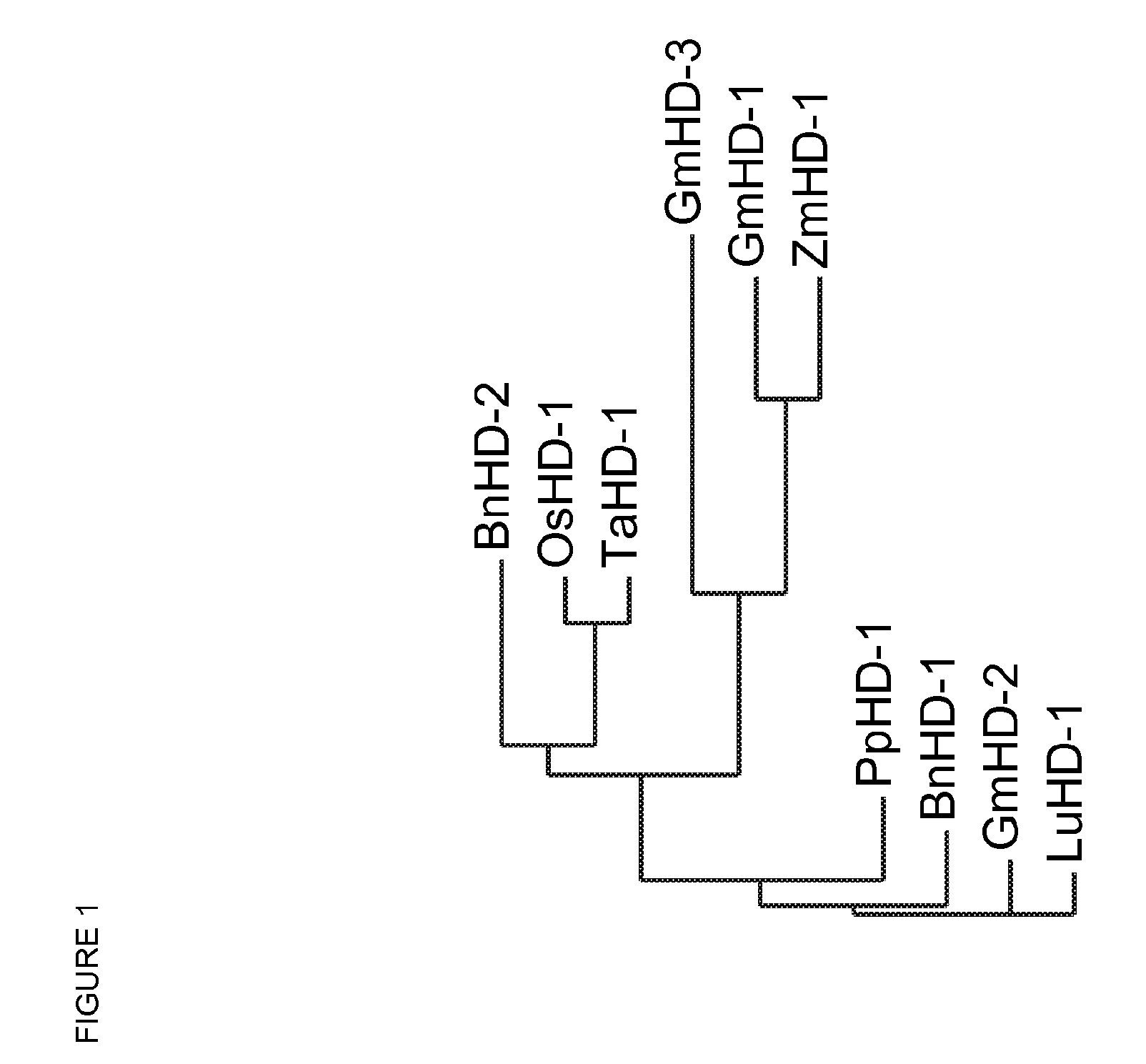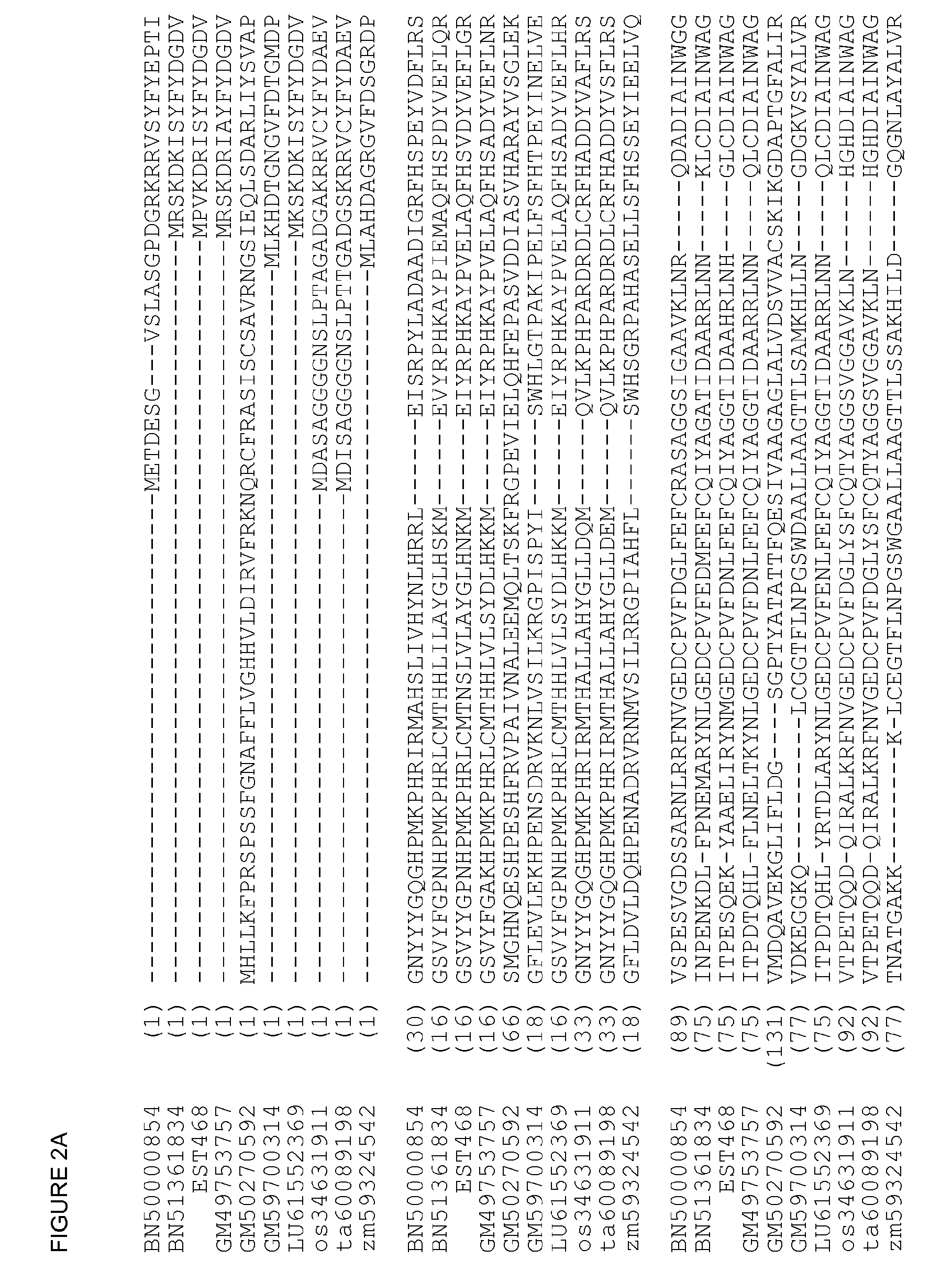Transgenic plant with increased stress tolerance and yield
a technology of stress tolerance and plant, applied in the field of transgenic plants, can solve the problems of limiting factors of plant growth and crop yield, cell death and consequently to yield loss, plant cells losing water, etc., and achieves the effect of increasing the yield of agricultural products of plants and increasing the growth of plants
- Summary
- Abstract
- Description
- Claims
- Application Information
AI Technical Summary
Benefits of technology
Problems solved by technology
Method used
Image
Examples
example 1
Identification of P. patens Open Reading Frames
[0111]cDNA libraries made from plants of the species P. patens (Hedw.) B.S.G. from the collection of the genetic studies section of the University of Hamburg were sequences using standard methods. The plants originated from the strain 16 / 14 collected by H. L. K. Whitehouse in Gransden Wood, Huntingdonshire (England), which was subcultured from a spore by Engel (1968, Am. J. Bot. 55:438-446).
[0112]Sequences were processed and annotated using the software package EST-MAX commercially provided by Bio-Max (Munich, Germany). The program incorporates practically all bioinformatics methods important for functional and structural characterization of protein sequences. For reference, see the website at pedant.mips.biochem.mpg.de. The most important algorithms incorporated in EST-MAX are: FASTA (Very sensitive sequence database searches with estimates of statistical significance; Pearson, 1990, Methods Enzymol. 183:63-98); BLAST (Very sensitive s...
example 2
Cloning of Full-Length cDNAs from Other Plants
[0132]Canola, soybean, rice, maize, linseed, and wheat plants were grown under a variety of conditions and treatments, and different tissues were harvested at various developmental stages. Plant growth and harvesting were done in a strategic manner such that the probability of harvesting all expressable genes in at least one or more of the resulting libraries is maximized. The mRNA was isolated from each of the collected samples, and cDNA libraries were constructed. No amplification steps were used in the library production process in order to minimize redundancy of genes within the sample and to retain expression information. All libraries were 3′ generated from mRNA purified on oligo dT columns. Colonies from the transformation of the cDNA library into E. coli were randomly picked and placed into microtiter plates.
[0133]Plasmid DNA was isolated from the E. coli colonies and then spotted on membranes. A battery of 288 33P radiolabeled 7...
example 3
Stress-Tolerant Arabidopsis Plants
[0138]A fragment containing the P. patens polynucleotide was ligated into a binary vector containing a selectable marker gene. The resulting recombinant vector contained the corresponding polynucleotide listed in Table 1 in the sense orientation under the constitutive super promoter. The recombinant vectors were transformed into Agrobacterium tumefaciens C58C1 and PMP90 plants according to standard conditions. A. thaliana ecotype C24 plants were grown and transformed according to standard conditions. T1 plants were screened for resistance to the selection agent conferred by the selectable marker gene, and T1 seeds were collected.
[0139]The P. patens polynucleotides were overexpressed in A. thaliana under the control of a constitutive promoter. T2 and / or T3 seeds were screened for resistance to the selection agent conferred by the selectable marker gene on plates, and positive plants were transplanted into soil and grown in a growth chamber for 3 week...
PUM
| Property | Measurement | Unit |
|---|---|---|
| pH | aaaaa | aaaaa |
| pH | aaaaa | aaaaa |
| pH | aaaaa | aaaaa |
Abstract
Description
Claims
Application Information
 Login to View More
Login to View More - R&D
- Intellectual Property
- Life Sciences
- Materials
- Tech Scout
- Unparalleled Data Quality
- Higher Quality Content
- 60% Fewer Hallucinations
Browse by: Latest US Patents, China's latest patents, Technical Efficacy Thesaurus, Application Domain, Technology Topic, Popular Technical Reports.
© 2025 PatSnap. All rights reserved.Legal|Privacy policy|Modern Slavery Act Transparency Statement|Sitemap|About US| Contact US: help@patsnap.com



